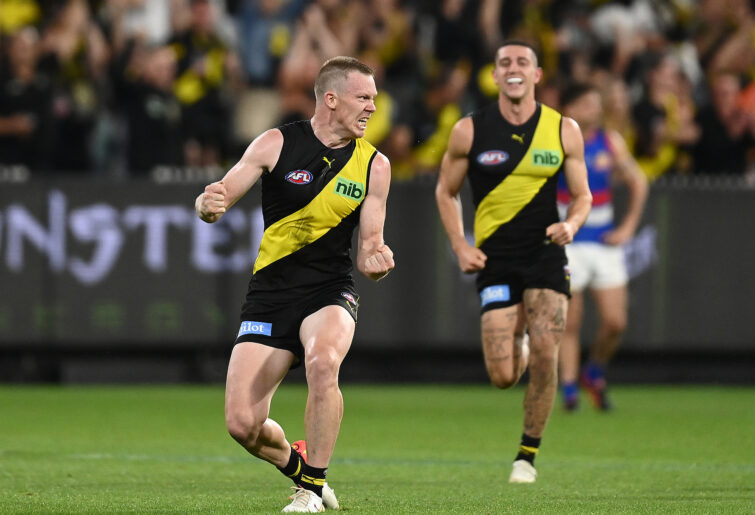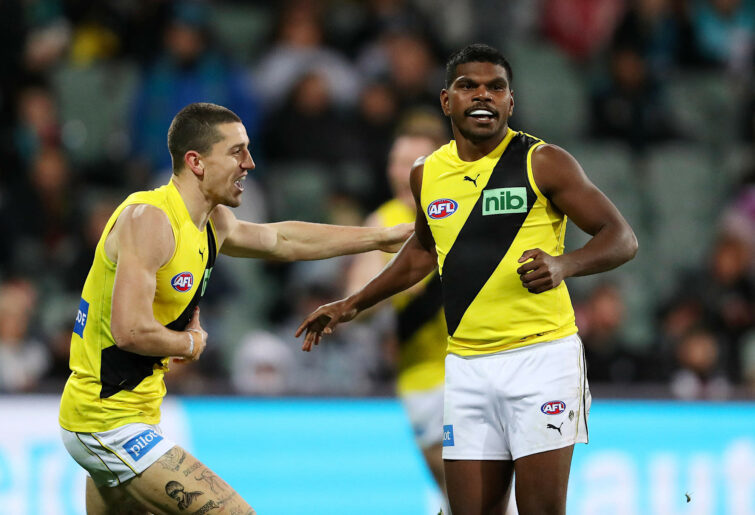
Throughout the season, the club has been ticking along and given a stretch of games with almost laughable conclusions, they’ve spent periods as the punchline to many a joke.
In late May, we asked the simple question: are the Tigers any good?
In the 11 games since that point in time, they’ve had six wins, four losses and a draw. Take it back an extra month and you can add four wins to the tally.
There was genuine heartbreak in the Gold Coast game, while being beaten by the “new coach bounce” of North Melbourne was more expected than non-Richmond supporters may think, without reducing the level of embarrassment suffered.
Yet for all the headlines and mockery, Richmond’s worst result since Round 6 has been a six-point loss.
Understandably, at the time the question had been posed, many were curious as to the validity of the club’s four-game winning streak, given it had been over West Coast, Hawthorn, Essendon and Collingwood, which we now know was a good win.
Maybe it’s uncool to rate Richmond. Maybe there should always be a grain of salt taken when discussing their results.
Many don’t realise just how impressive the team’s record has been for the majority of the season, or perhaps they choose to ignore it due to a lack of perceived fixture difficulties.
In these last 11 games that we’re focusing on, the Tigers have played Sydney, Geelong, Brisbane, Fremantle and Carlton. Port Adelaide featured twice too as last year’s second-placed team, which would indicate the draw wasn’t designed to be a cakewalk for the team.
In essence, to answer the aforementioned question, yes the Tigers are pretty good.
Against really good opposition, they’ve played strong footy. In every one of their last 15 games, they’ve been in winnable positions.
During this time, they’ve had games missed from Dustin Martin, Dion Prestia, Dylan Grimes, Tom Lynch and Nick Vlastuin among others, the most important players to the team’s structure.

(Photo by Quinn Rooney/Getty Images)
What got masked in that three-week block of winless ridiculousness was the fact the Tigers played better footy than their opponents for the majority of those games. It’s the tale of the season for Richmond and speaks volumes to putting more weight on the process of winning rather than the immediate result.
Since Round 11, the Tigers are averaging 95 points per game, including breaking the triple-figure barrier against Brisbane and Sydney, two teams that pride themselves on strong defence.
It truly has been peak Richmond, with the team seemingly firing on all cylinders.
Everything that made them so dangerous in years gone by has re-emerged, with a lot of young talent leading the way.
There’s speed and pressure all over the ground, there’s the desire to send the ball forward at all costs and there’s the never-say-die attitude – the Lions lead the Tigers by seven goals during the second quarter of their Round 20 clash.
Most importantly, though, there’s an evenness in the forward half of the field that suits the unpredictability the Tigers love to play with.
Lynch is the main target and has been rewarded with 55 goals in 17 matches. Jack Riewoldt is more of a secondary, tap-on type of player these days, roaming around nearly as a half-forward across the arc at times. He has 36 goals in 19 games.

(Photo by Quinn Rooney/Getty Images)
Shai Bolton’s incredible season has continued, with 40.39 and 16 goal assists, while still being one of the league’s best centre clearance players.
But the real X-factor has been the emergence of Noah Cumberland, whose combination of goal smarts, strength and mobility has forced teams to put a strong defender on him. He kicked five goals on lauded defender Darcy Gardiner.
On the other side of the equation is the defence, where they’ve conceded 81.09 points per game during the same period of time.
Defensive shortcomings are the main thing that separates Richmond from becoming true contenders, or at least what will have many rule them out of being a genuine threat.
A quick glance at the points conceded column will tell you that the Tigers are trying to win in shootouts, by outscoring the opposition without much care for the defensive side of the ball.
Sure, letting the opposition get 81 points per game is hardly going to result in guaranteed wins, but again, Richmond’s very much a processs-driven team rather than one that overreacts, as those outside the club do.
On the season, they’ve conceded scores in 44.3 per cent of inside 50s which is really quite bad. It’s a worse rate than Hawthorn and Adelaide.
However since Round 11, they’ve tightened up slightly, with the percentage dropping to 42.88 per cent. It’s hardly revolutionary, but it’s an improvement.
It has coincided with the resurgence of Robbie Tarrant’s reading of the play, peeling off and helping to double-team at times, while the positional switch between Noah Balta and Ben Miller has looked more natural.
Given the absence of Grimes, one of the league’s best one-on-one defenders, this improvement should be given more attention.
The numbers are still average for the Tigers, yet in terms of firepower and tactical nous, no team is quite as dangerous offensively as Richmond with the exception of Craig McRae’s yellow-and-black inspired Collingwood.
On paper, all of this points towards a dangerous team, but maybe not one that can win it all.
Given the golden era wasn’t long ago, we can quickly compare the numbers.
For all of Richmond’s greatness, this is exactly how they were successful. Overwhelm the opposition with pressure, get the ball forward at all costs and outscore everyone.
In 2019, they conceded a score in 42.65 per cent of entries – sound familiar?
There’s also been a big misconception that Richmond’s tackling is what made them so successful but rather, it’s the pressure applied that has suffocated the opposition.
Between 2017 and 2020, they were ranked seventh, 14th, 11th and eighth for tackling in the league.
In 2019 and 2020, they were ranked 11th and 18th respectively for tackles inside 50.
Much has been made in recent times of Maurice Rioli Jnr’s incredible season, averaging over 10 points per game created through his pressure acts, yet the Tigers are ranked 17th and 15th respectively for tackles and those completed inside 50.

(Photo by Sarah Reed/AFL Photos via Getty Images)
Other key indicators are lining up nicely.
They’re ranked first for metres gained, third for intercepts and marks inside 50 and fourth for contested marks. For those playing at home, they’ve also committed the fourth-most turnovers and guess which team lead that statistic in the four years they were the best team in the league?
But perhaps more interestingly, the tackling statistic that holds more weight for this team is how many times they get caught per game.
Because unlike different teams that concede the fewest in the league, who either don’t have enough of the ball to be caught, or play an uncontested, retentive style, the Tigers are at their best when they get the ball forward.
If you consider the mix of ranking highly for metres gained, marks inside 50 and contested marks with conceding the second-fewest tackles, you have the triple-Premiership mix that Richmond relied upon.
2021 was a disjointed effort between offence and defence, a down year where things didn’t flow as easily.
This season, all the key indicators are back up and Richmond finds themselves ranked highly in all the key statistics that brought them such great success.
More than anything, though, the Tiger aura is back.
Opposition fans aren’t wanting to play against them and coaches know that this team has started to fire on all cylinders.
And if you don’t believe that there’s a bit of déjà vu at play here, Trent Cotchin last month of football has seen him average 27 disposals, 13 contested possessions, 5.5 clearances, 5.3 tackles, 4.3 inside 50s and contribute five goal assists – not bad for a player written off by the entire football public.
While they’ve hovered on the fringes of the top eight for the majority of the season, the Tigers have rejuvenated their list with young talent getting plenty of game time and have recaptured the scintillatingly dangerous football that took them to the promised land.
It’s a team that hasn’t lost by more than a goal for four months and will look to bring back Dustin Martin and potentially Dylan Grimes into the team for finals.
A tumultuous three-week period brought great joy to opposition fans but look beyond the surface and maybe the team should’ve been taken more seriously earlier on.
The Tigers are back to their best and are a true Premiership contender in 2022.
Tiger time isn’t over yet.

Leave a Reply